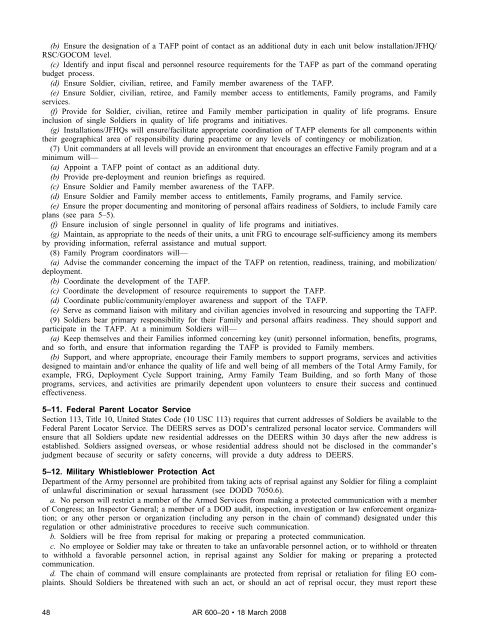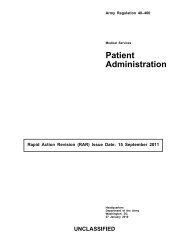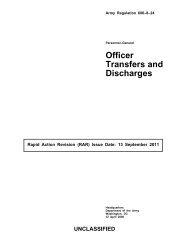AR 600-20, Army Command Policy - Army Publishing Directorate ...
AR 600-20, Army Command Policy - Army Publishing Directorate ...
AR 600-20, Army Command Policy - Army Publishing Directorate ...
You also want an ePaper? Increase the reach of your titles
YUMPU automatically turns print PDFs into web optimized ePapers that Google loves.
(b) Ensure the designation of a TAFP point of contact as an additional duty in each unit below installation/JFHQ/<br />
RSC/GOCOM level.<br />
(c) Identify and input fiscal and personnel resource requirements for the TAFP as part of the command operating<br />
budget process.<br />
(d) Ensure Soldier, civilian, retiree, and Family member awareness of the TAFP.<br />
(e) Ensure Soldier, civilian, retiree, and Family member access to entitlements, Family programs, and Family<br />
services.<br />
(f) Provide for Soldier, civilian, retiree and Family member participation in quality of life programs. Ensure<br />
inclusion of single Soldiers in quality of life programs and initiatives.<br />
(g) Installations/JFHQs will ensure/facilitate appropriate coordination of TAFP elements for all components within<br />
their geographical area of responsibility during peacetime or any levels of contingency or mobilization.<br />
(7) Unit commanders at all levels will provide an environment that encourages an effective Family program and at a<br />
minimum will—<br />
(a) Appoint a TAFP point of contact as an additional duty.<br />
(b) Provide pre-deployment and reunion briefings as required.<br />
(c) Ensure Soldier and Family member awareness of the TAFP.<br />
(d) Ensure Soldier and Family member access to entitlements, Family programs, and Family service.<br />
(e) Ensure the proper documenting and monitoring of personal affairs readiness of Soldiers, to include Family care<br />
plans (see para 5–5).<br />
(f) Ensure inclusion of single personnel in quality of life programs and initiatives.<br />
(g) Maintain, as appropriate to the needs of their units, a unit FRG to encourage self-sufficiency among its members<br />
by providing information, referral assistance and mutual support.<br />
(8) Family Program coordinators will—<br />
(a) Advise the commander concerning the impact of the TAFP on retention, readiness, training, and mobilization/<br />
deployment.<br />
(b) Coordinate the development of the TAFP.<br />
(c) Coordinate the development of resource requirements to support the TAFP.<br />
(d) Coordinate public/community/employer awareness and support of the TAFP.<br />
(e) Serve as command liaison with military and civilian agencies involved in resourcing and supporting the TAFP.<br />
(9) Soldiers bear primary responsibility for their Family and personal affairs readiness. They should support and<br />
participate in the TAFP. At a minimum Soldiers will—<br />
(a) Keep themselves and their Families informed concerning key (unit) personnel information, benefits, programs,<br />
and so forth, and ensure that information regarding the TAFP is provided to Family members.<br />
(b) Support, and where appropriate, encourage their Family members to support programs, services and activities<br />
designed to maintain and/or enhance the quality of life and well being of all members of the Total <strong>Army</strong> Family, for<br />
example, FRG, Deployment Cycle Support training, <strong>Army</strong> Family Team Building, and so forth Many of those<br />
programs, services, and activities are primarily dependent upon volunteers to ensure their success and continued<br />
effectiveness.<br />
5–11. Federal Parent Locator Service<br />
Section 113, Title 10, United States Code (10 USC 113) requires that current addresses of Soldiers be available to the<br />
Federal Parent Locator Service. The DEERS serves as DOD’s centralized personal locator service. <strong>Command</strong>ers will<br />
ensure that all Soldiers update new residential addresses on the DEERS within 30 days after the new address is<br />
established. Soldiers assigned overseas, or whose residential address should not be disclosed in the commander’s<br />
judgment because of security or safety concerns, will provide a duty address to DEERS.<br />
5–12. Military Whistleblower Protection Act<br />
Department of the <strong>Army</strong> personnel are prohibited from taking acts of reprisal against any Soldier for filing a complaint<br />
of unlawful discrimination or sexual harassment (see DODD 7050.6).<br />
a. No person will restrict a member of the Armed Services from making a protected communication with a member<br />
of Congress; an Inspector General; a member of a DOD audit, inspection, investigation or law enforcement organization;<br />
or any other person or organization (including any person in the chain of command) designated under this<br />
regulation or other administrative procedures to receive such communication.<br />
b. Soldiers will be free from reprisal for making or preparing a protected communication.<br />
c. No employee or Soldier may take or threaten to take an unfavorable personnel action, or to withhold or threaten<br />
t o w i t h h o l d a f a v o r a b l e p e r s o n n e l a c t i o n , i n r e p r i s a l a g a i n s t a n y S o l d i e r f o r m a k i n g o r p r e p a r i n g a p r o t e c t e d<br />
communication.<br />
d. The chain of command will ensure complainants are protected from reprisal or retaliation for filing EO complaints.<br />
Should Soldiers be threatened with such an act, or should an act of reprisal occur, they must report these<br />
48 <strong>AR</strong> <strong>600</strong>–<strong>20</strong> 18 March <strong>20</strong>08
















